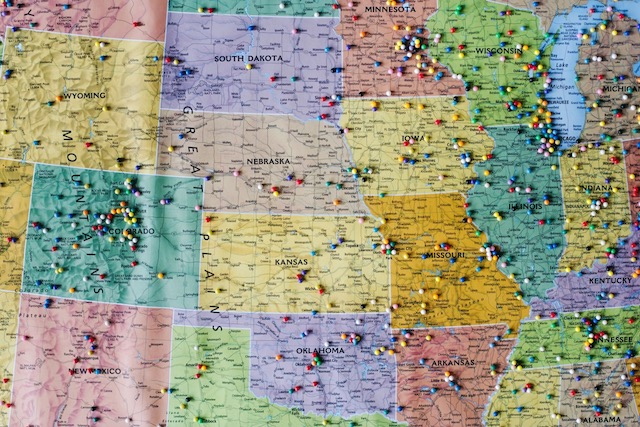For sales tax assessment on purchases, the general rule of thumb has always been “products are taxable, while services are non-taxable.”
Under that scenario, if your business sells coffee mugs, you should charge sales tax for those products. But if your business creates logos for coffee shops, you shouldn’t charge sales tax for those services.
However, as with anything sales tax-related, there are plenty of exceptions to this rule. Why?
- Each of the 46 US states with a sales tax makes their own rules and laws.
- States are expanding their tax bases, and for some states that includes requiring sales tax on services that were previously non-taxable.
- The digital world is blurring the line between products and services. Is an ebook a tangible product or is the ability to download it a service? How about software-as-a-service? Each state gets to decide.
What constitutes a “service” for sales tax purposes?
The term services encompasses a wide variety of businesses. Services are organized into these four categories:
- Business services – These include services for businesses such as advertising, computer services, human resources services, lobby, and consulting and payroll services.
- Personal services – These include services such as dry cleaning, hair care, and tanning salons.
- Professional services – These include services provided by accountants, architects, attorneys, and doctors.
Maintenance and repair services – These include services that are provided to tangible personal property (i.e. cars, your house) or improvements to buildings and land (i.e. landscaping)
Which states impose a service tax?
While services are not subject to sales tax in all states, it’s important to note that exclusions are not absolute. Here’s what you need to know about the general services sales tax landscape:
- Five US states (New Hampshire, Oregon, Montana, Alaska, Delaware) don’t impose any general, statewide sales tax on goods and services.
- Four US states (Hawaii, South Dakota, New Mexico, West Virginia) tax services by default, with exceptions only for services specifically exempted in the law.
- The remaining 41 states and the District of Columbia do not tax services by default, but services specified by the state may be taxed.
Of course, if you do business in more than one state, you must understand how each state treats each of your particular products or services.
For example, in Hawaii, services are taxable unless specified otherwise. But in Texas, dry cleaning is taxable while veterinary services are not. Why? It’s simply because the state says so.
Subscribe to our free sales tax newsletter
Sales tax is complex, and always changing. But staying up to date on sales tax news is crucial for businesses. Sign up to stay on top of changes that can impact your sales tax compliance.
Sign upA state-by-state guide to sales tax on services
Where are services taxable? Use our chart to quickly assess service tax guidelines in states where you have nexus.
| State | Services are taxable | Services are not taxable |
| Alabama | ❌ (with some exceptions) | |
| Alaska | ❌ | |
| Arizona | ❌ (with some exceptions) | |
| Arkansas | ✔️ | |
| California | ❌ | |
| Colorado | ❌ | |
| Connecticut | ✔️ | |
| Florida | ❌ (with some exceptions) | |
| Georgia | ❌ | |
| Hawaii | ✔️ | |
| Idaho | ❌ (unless the service involves creating or manufacturing a product) | |
| Illinois | ❌ | |
| Indiana | ❌ | |
| Iowa | ✔️ | |
| Kansas | ✔️ | |
| Kentucky | ❌ (with some exceptions) | |
| Louisiana | ❌ (with some exceptions) | |
| Maine | ❌ (with some exceptions) | |
| Maryland | ❌ (with some exceptions) | |
| Massachusetts | ❌ | |
| Michigan | ❌ | |
| Minnesota | ❌ (with some exceptions) | |
| Mississippi | ✔️ | |
| Missouri | ❌ (with some exceptions) | |
| Montana | ❌ | |
| Nebraska | ❌ (with some exceptions) | |
| Nevada | ❌ | |
| New Hampshire | ❌ | |
| New Jersey | ✔️ | |
| New Mexico | ✔️ (Many services are subject to gross tax receipts). | |
| New York | ✔️ | |
| North Carolina | ❌ (with some exceptions) | |
| North Dakota | ❌ (with some exceptions) | |
| Ohio | ✔️ | |
| Oklahoma | ✔️ | |
| Oregon | ❌ | |
| Pennsylvania | ✔️ | |
| Rhode Island | ❌ | |
| South Carolina | ❌ (with some exceptions) | |
| South Dakota | ✔️ (with some exceptions) | |
| Tennessee | ❌ (with some exceptions) | |
| Texas | ✔️ | |
| Utah | ✔️ | |
| Vermont | ❌ (with some exceptions) | |
| Virginia | ❌ (with some exceptions) | |
| Washington, D.C. | ❌ (with some exceptions) | |
| Washington | ✔️ | |
| West Virginia | ✔️ (with some exceptions) | |
| Wisconsin | ✔️ | |
| Wyoming | ❌ (with some exceptions) |
How to stay compliant with sales tax when you sell services
It’s important for every business to perform a nexus study, which reviews all your business activities and sales in a state or multiple states and determines if these activities create sales tax nexus.
Your business should conduct a nexus study when you start selling in a new state or when you start selling a new product or service.
Consider this example: say you are a CPA in Arizona, (where CPA services are not taxable. If you open a second office in New Mexico, you need to understand that while Arizona doesn’t require CPAs to charge sales tax on their services, New Mexico does. This means, you must register with the state, ensuring you collect and remit New Mexico gross receipts tax (GRT, their equivalent of sales tax) at state-specified intervals. If you fail to collect from your New Mexico customers, you’re on the hook for paying New Mexico GRT out of your own profits.
Once you’ve conducted a nexus study, your next steps are:
- Ensure you are registered for a sales tax permit in every state in which you are required to collect sales tax.
- Ensure that you charge the right sales tax rates. Establish rate tables and do your product taxability research; understand jurisdictional boundaries and where those rates apply, and keep up with any changes.
- File your returns. In the states where you’re registered, know your due dates, submit your returns, and remit any payments necessary.
Managing all the moving parts of sales tax can be challenging. Are accounting services taxed? What about hair care or car maintenance? They may not be taxed in your state today, but sales tax laws change all the time.
TaxJar makes it easier for you to stay current with it all, especially as you scale your business across states.
If you need to charge sales tax on services, TaxJar takes all of these state laws into account and simplifies the process. To learn more about TaxJar and get started automating your sales tax compliance, sign up for a free, 30-day trial today.



